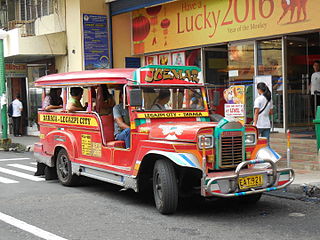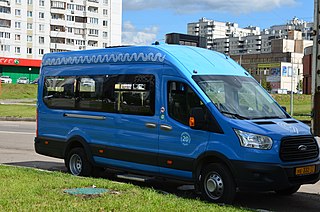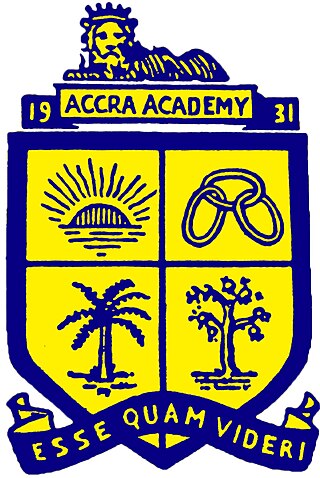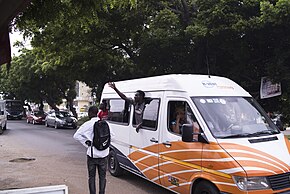
Transport in Ghana is accomplished by road, rail, air and water. Ghana's transportation and communications networks are centered in the southern regions, especially the areas in which gold, cocoa, and timber are produced. The northern and central areas are connected through a major road system.

Accra is the capital and largest city of Ghana, located on the southern coast at the Gulf of Guinea, which is part of the Atlantic Ocean. As of 2021 census, the Accra Metropolitan District, 20.4 km2 (7.9 sq mi), had a population of 284,124 inhabitants, and the larger Greater Accra Region, 3,245 km2 (1,253 sq mi), had a population of 5,455,692 inhabitants. In common usage, the name "Accra" often refers to the territory of the Accra Metropolitan District as it existed before 2008, when it covered 199.4 km2 (77.0 sq mi). This territory has since been split into 13 local government districts: 12 independent municipal districts and the reduced Accra Metropolitan District (20.4 km2), which is the only district within the capital to be granted city status. This territory of 199.4 km2 contained 1,782,150 inhabitants at the 2021 census, and serves as the capital of Ghana, while the district under the jurisdiction of the Accra Metropolitan Assembly proper (20.4 km2) is distinguished from the rest of the capital as the "City of Accra".

Kotoka International Airport is an international airport in Accra, the capital of Ghana. The airport is operated by Ghana Airports Company Limited (GACL), which has its offices on the airport property. It is the sole international airport in Ghana.

The cedi is the unit of currency of Ghana. It is the fourth historical and only current legal tender in the Republic of Ghana. One Cedi is divided into one hundred Pesewas (Gp).

Ghana Airways Limited was the flag carrier of Ghana, with its main base of operation and hub at Kotoka International Airport in Accra. The airline ceased operations in 2004, although plans were discussed to revive it in 2020 in partnership with Egyptair.

A share taxi is a mode of transport which falls between a taxicab and a bus. These vehicles for hire are typically smaller than buses and usually take passengers on a fixed or semi-fixed route without timetables, but instead departing when all seats are filled. They may stop anywhere to pick up or drop off their passengers. Often found in developing countries, the vehicles used as share taxis range from four-seat cars to minibuses. They are often owner-operated.

Tamale is the capital city of the Northern Region of Ghana. It is Ghana's third largest city, with a population of 758000. The city has been ranked as the fastest-growing city in West Africa. Tamale is located in the Kingdom of Dagbon, Ghana's oldest Kingdom.

A minibus, microbus, or minicoach is a passenger-carrying motor vehicle that is designed to carry more people than a multi-purpose vehicle or minivan, but fewer people than a full-size bus. In the United Kingdom, the word "minibus" is used to describe any full-sized passenger-carrying van or panel truck. Minibuses have a seating capacity of between 12 and 30. Larger minibuses may be called midibuses. Minibuses are typically front engine step-in vehicles, although low floor minibuses are particularly common in Japan.

Marshrutnoye taksi, commonly known by the colloquialism Marshrutka, are share taxis found in Eastern Europe and the republics of the former Soviet Union. Usually vans, they drive along set routes, depart only when all seats are filled, and may have higher fares than buses. Passengers can board a marshrutka anywhere along its route if there are seats available.
Each "article" in this category is a collection of entries about many stamp issuers, presented in alphabetical order. The entries are formulated on the micro model and so provide summary information about all known issuers.

Dala dala are minibus share taxis in Tanzania. These converted trucks and minibuses are the primary public transportation system in the country. While the name originates from the English word "dollar", they are also referred to as thumni.

In Kenya, matatu or matatus are privately owned minibuses used as share taxis. Often decorated, many matatu feature portraits of famous people or slogans and sayings. Likewise, the music they play is also aimed at quickly attracting riders. Over 70% of commuter trips are taken using matatu in cities like Nairobi.

Accra Academy is a boys' high school located at Bubuashie near Kaneshie in the Greater Accra Region, Ghana. It admits both boarding and day students. Founded as a private school in 1931, it gained the status of a Government-Assisted School in 1950. It is the oldest existing high school to have been privately founded in the Gold Coast.

The Meltwater Entrepreneurial School of Technology (MEST) is an Africa-wide technology entrepreneur training program, seed fund, and incubator headquartered in Accra, Ghana. The three-phased institution was founded in 2008 to provide training, investment, and mentoring for aspiring technology entrepreneurs with the goal of creating globally successful companies that create wealth and jobs locally in Africa.

Uroa, sometimes spelled Urowa, is a small, rural coastal village on central eastern parts of Unguja in Tanzania. It is situated in the Chwaka Constituency in the Unguja South Region. It is located in the Uroa Bay, approximately halfway between the villages of Kiwengwa and Chwaka; 21.7 miles (34.9 km) north of Zanzibar Town. It is located 5.6 miles (9.0 km) north of Chwaka and 7.1 miles (11.4 km) south of Kiwengwa. Uroans mostly live on fishing and seaweed farming; tourism is also developing in the area, although to a lesser extent than on the south-eastern coast around Jambiani. It is a small and centerless village with resorts on the southern and northern side of its bay. It is home to only six stores and is recognized as a traditional, slow-paced, and spread-out village. Uroa Village stretches in a narrow, long line from south to north along the coastline, appropriately named Uroa Beach. The elevation of the town is only 3.2 feet on average. Its economy has traditionally relied on fishing and seaweed collecting, but has since 2008 experienced a growth in tourist accommodation. In addition, recent years have also seen an increase in governmental jobs such as health workers, administrators and teachers. New sources of income have contributed to an increased median income for Uroans, however, the income is fairly unequally distributed. For instance, the monthly income for seaweed farmers represent only U.S. $7 per farmer, while Uroans working in the tourist industry makes U.S. $65 on average per month.
Africa World Airlines Limited (AWA) is a Ghanaian airline company that was incorporated in 2010 and commenced flights in 2012. It has its head office in Airport City Accra, and its main hub at Kotoka International Airport in Accra.

Visitors to Ghana must obtain a visa from one of the Ghanaian diplomatic missions unless they come from one of the countries or territories that are either visa exempt or whose citizens may obtain a visa on arrival.
Tourism in Ghana is regulated by the Ministry of Tourism, Arts & Culture. This ministry is responsible for the development and promotion of tourism related activities in Ghana.

The Government of Ghana initially responded to the virus through a nationwide disinfection and fumigation exercise which began in April 2020. In order to curb the spread of the virus, the government enforced lockdowns, aggressive contact tracing, public bans and social measures such as encouraging the wearing of face masks. By April, it began the gradual reopening of the country; lifting all lockdowns while maintaining protocols such as social distancing. Throughout the pandemic, the government partnered with the private sector in order to roll out economic reliefs and recovery programs as a result of the impact of the pandemic on Ghana's economy. There was also an expansion of medical facilities and the improvement of testing logistics.

Most governments decided to temporarily close educational institutions in an attempt to reduce the spread of COVID-19. As of 12 January 2021, approximately 825 million learners are affected due to school closures in response to the pandemic. According to UNICEF monitoring, 23 countries are implementing nationwide closures and 40 are implementing local closures, impacting about 47 percent of the world's student population. 112 countries' schools are open.




















